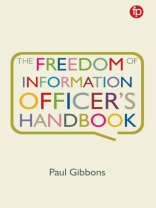Freedom of information (FOI) is now an international phenomenon with over 100 countries from Albania to Zimbabwe enacting the right to know for their citizens. Since 2005, the UK’s Freedom of Information Act has opened up thousands of public bodies to unparalleled scrutiny and prompted further moves to transparency.
Wherever the right to know is introduced, its success depends on the way it is implemented. In organisations worldwide, FOI only works because of those who oversee its operation on a day-to-day basis, promoting openness, processing requests and advising colleagues and the public. FOI is dependent on the FOI Officers.
The Freedom of Information Officer’s Handbook is a comprehensive guide to FOI and its management. It is designed to be an indispensable tool for FOI Officers and their colleagues. It includes:
- a guide to the UK’s FOI Act, the right to know and the exemptions
- clear analysis of the most important case law and its implications for the handling of FOI requests
- pointers to the best resources to help FOI officers in their work
- explanations of how FOI interacts with other legislation, including detailed explorations of the Environmental Information Regulations 2004 and how the EU’s General Data Protection Regulation impacts on FOI
- a look at requirements to proactively publish information and the effect of copyright and re-use laws on FOI and open data
- comparisons of the UK’s Act with FOI legislation in other jurisdictions from Scotland to South Africa
- an exploration of the role of the FOI Officer: who they are, what they do, their career development and what makes them effective
- suggestions on how to embed FOI within an organisation using effective procedures, technology and training
- a stage-by-stage guide to processing requests for information.
The Freedom of Information Officers’ Handbook includes the latest developments in FOI including amendments made to the UK’s FOI Act by the Data Protection Act 2018 and the revised s.45 code of practice published by the Cabinet Office in July 2018.
Tabla de materias
Acknowledgements
Abbreviations
Introduction
Part 1: Understanding FOI
1. A brief history of freedom of information
2. Understanding the Act
3. The exemptions in the Freedom of Information Act
4. The FOI officer’s toolkit
Part 2: FOI in Context
5. The Environmental Information Regulations
6. The Freedom of Information Act, personal information and the GDPR
7. Records and archives
8. Publication schemes and proactive disclosure
9. Copyright and re-use of information
Part 3: FOI in Practice
10. The FOI officer
11. Embedding FOI
12. Managing FOI requests
13. Communicating with applicants
14. Internal reviews and appeals
Appendices
Appendix 1 – Methodology of survey of English local authorities
Appendix 2 – FOI response templates
Appendix 3 – Privacy notice for FOI requests
Notes
Index
Sobre el autor
Paul Gibbons began his career as an archivist and records manager in the pharmaceutical industry. Following this he worked as a records manager in local government and in the Houses of Parliament. In 2003, he moved to the Greater London Authority where he helped prepare the Mayor of London’s headquarters for the Freedom of Information Act, and later worked in the NHS and in higher education as an FOI and information governance practitioner. In 2010, he established the FOIMan blog and Twitter feed to present a different perspective on FOI – the insider’s view. His evidence was noted by the Justice Select Committee in its post-legislative scrutiny of FOI in 2012, during the course of which he formed part of the online Save FOI campaign. Since 2014, Paul has been working as a freelance trainer specialising in FOI and data protection. He has written extensively on FOI and other subjects and has a regular column in PDP’s Freedom of Information Journal. He has also been interviewed on BBC Radio and featured in Times Higher Education magazine and the Daily Telegraph. He is a regular speaker at events including PDP’s annual FOI conference and Information and Records Management Society meetings and conferences.












